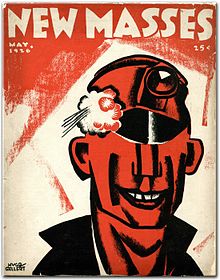New Masses

New Masses cover by Hugo Gellert, May 1926
|
|
| Former editors | Michael Gold, Walt Carmon, Whittaker Chambers, Joseph Freeman, Granville Hicks |
|---|---|
| First issue | 1926 |
| Final issue | 1948 |
| Country | United States |
The New Masses, published from 1926 until 1948, was an American Marxist magazine closely associated with the Communist Party, USA. With the coming of the Great Depression in 1929 America became more receptive to ideas from the political Left and The New Masses became highly influential in intellectual circles. The magazine has been called “the principal organ of the American cultural left from 1926 onwards."
The New Masses was launched in New York City in 1926 as part of the Workers (Communist) Party of America's publishing stable, produced by a communist leadership but making use of the work of an array of independent writers and artists. The magazine was established to fill a void caused by the gradual transition of The Workers Monthly (successor to The Liberator) into a more theoretically-oriented publication. The name of the new magazine was a tip of the hat to The Masses (1911–1917), the forerunner of both of these publications.
The editorial staff of the New Masses included Masses alumni Hugo Gellert, John F. Sloan, Max Eastman, Mike Gold, as well as Joseph Freeman, Granville Hicks (starting in 1934), Walt Carmon, and James Rorty. Many contributors are now considered distinguished, even canonical authors/writers: William Carlos Williams, Theodore Dreiser, John Dos Passos, Upton Sinclair, Richard Wright, Ralph Ellison, Dorothy Parker, Dorothy Day, John Breecher, Langston Hughes, Eugene O'Neill, Rex Stout and Ernest Hemingway. More importantly, it also circulated works by avowedly leftist, even “proletarian” (working-class) artists: Kenneth Fearing, H.H. Lewis, Jack Conroy, Grace Lumpkin, Jan Matulka, Ruth McKenney, Maxwell Bodenheim, Meridel LeSueur, Josephine Herbst, Jacob Burck, Tillie Olsen, Stanley Burnshaw, Louis Zukofsky, George Oppen, Wanda Gág, and Albert Halper.
...
Wikipedia
